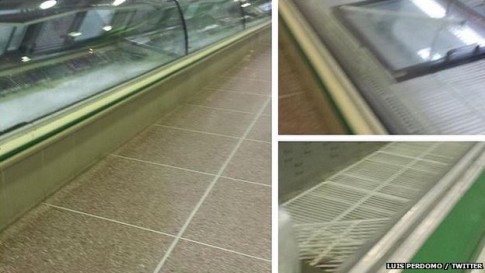– Venezuela To Start Fingerprinting Supermarket Shoppers (ZeroHedge, March 9, 2015):
Back in August, when we wrote about the latest instance of trouble in Maduro’s socialist paradise, we cautioned that as a result of the economic collapse in the Latin American nation (and this was even before the plunge in crude made the “paradise” into the 9th circle of hell), Venezuelans soon may need to have their fingerprints scanned before they can buy bread and other staples. This unprecedented step was proposed after Maduro had the brilliant idea of proposing mandatory grocery fingerprinting system to combat food shortages. He said then that “the program will stop people from buying too much of a single item”, but did not say when it would take effect.
Privacy concerns aside (clearly Venezuelans have bigger, well, smaller fish to fry) there was hope that this plunge into insanity would be delayed indefinitely, as the last thing Venezuela’s strained economy would be able to handle is smuggling of the most basic of necessities: something such a dramatic rationing step would surely lead to.
Unfortunately for the struggling Venezuelan population, the time has arrived and as AP reported over the weekend, Venezuela “will begin installing 20,000 fingerprint scanners at supermarkets nationwide in a bid to stamp out hoarding and panic buying” as of this moment.
The government has been selectively rolling out the rationing system for months at state-run supermarkets along the western border with Colombia where smuggling of price-controlled goods is a major problem.
On Saturday, President Nicolas Maduro said that seven large private retail chains had voluntarily agreed to install the scanners.
Last month the owners of several chains of supermarkets and drugstores were arrested for allegedly artificially creating long queues by not opening enough tills.
It gets better: Maduro also accused Colombian food smugglers of buying up price-controlled goods in state-run supermarkets along the border.
For the first time in recent history the economists who say the effort is bound to fail, are right. They blame Venezuela’s rigid price controls that discourage local manufacturing and the recent slide in world oil prices that has further diminished the supply of dollars available to import everything from milk to cars.
As BBC further adds, in January the hashtag #AnaquelesVaciosEnVenezuela (“Empty shelves in Venezuela”) became a worldwide Twitter trend, with over 200,000 tweets as Venezuelans tweeted pictures of empty supermarket shelves around the country.
‘Empty shelves in Venezuela’ became a worldwide Twitter phenomenon
Last week South American foreign ministers said the region would help Venezuela address the shortages.
The lack of staple foods and medicines has contributed to discontent and to frequent large, often violent anti-government demonstrations.
What assures that Venezuela is bound to become the next Greece is that the one saving grace the socialist nation had left, high oil prices, aren’t coming back for a long time, which effectively makes the country’s oil production industry a drain of cash, cash the country can’t afford to spend, at current oil prices. As a reminder, crude oil amounts for 95% of the country’s exports. Venezuela’s plummeting currency rates and the falling price of oil by nearly half since November has diminished its supply of dollars to buy imported food.
The good news is that with the world having no lack of failed countries in the past year, for the IMF this should be a token state-rebuilding exercise for Christine Lagarde and her henchmen. One knows they have had more than enough “sovereign bail out” experience in the past year, the one in which the world was supposedly on the road to “recovery.”

